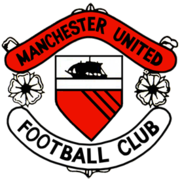 | 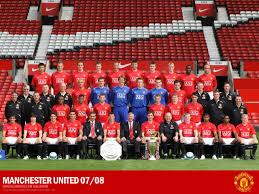 | 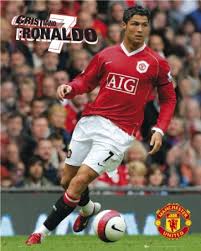 |  |  |
English Premier League
England
The Barclays English Premier League (EPL), considered as the best in the world.
Fulham FC vs Manchester United
Official name Fulham FC
City London
Founded 1879
Club colors White / Black / White
vs.
0 - 0
Manchester United
Official name Manchester United FC
City Manchester
Founded 1878
Club colors Red / White / White
Match scheduled:
Date: 19-12-2009
Time:15:00 until 17:00
Week 18 / Round 18 :: Barclays Premier League 2009/2010

The aforementioned 3rd Division hiatus lasted only two seasons though, they were then promoted back to the Second Division as runners-up in 1970-71. This spell also saw Fulham invited to the not particularly prestigious Anglo-Italian Cup, which saw the club draw four out of four games in two appearances in tournament between 1972 and 1974. Thus started of a period of high-profile signings for the club under Alec Stock in the mid-70s, including Alan Mullery and Bobby Moore. The reward of this was their only ever FA Cup final in 1975, having won their first semi-final in five attempts. The club then lost to West Ham in the final. This gained the club qualification to another low-key European tournament, the Anglo-Scottish Cup, where they made the final, losing to Middlesbrough.
That run in the FA Cup saw the setting of an improbable record, that of the most games needed to reach the final, Fulham playing 11 games including replays. In the build up to the 12th game, the Wembley final, Tony Rees and The Cottagers released a single, "Viva el Fulham" (based on Manolo Escobar's "Y viva España") which is still played (and occasionally chanted) at Fulham games. It reached No.46 in the Pop Charts in 1975. The club set another record in the 70s, when they took part in the first ever British league game to be played on a Sunday against Millwall F.C. in 1974, which was staged at The Den.[16]
Micky Adams was appointed as manager and oversaw an upturn in form that lifted the side out of what little relegation danger was present. The next season he engineered a complete turnaround in form and his side, captained by Simon Morgan, finished second - only missing out on first place due to the league dropping the old "goal difference" system in favour of a "goals scored" tally. (While Fulham's goal difference was one better than that of champions Wigan Athletic, they scored twelve fewer goals.) This was somewhat ironic, as the club's then Chairman Jimmy Hill, had successfully argued that goals scored should decide places of teams tied on points while sitting on an FA panel.

The following season saw Fulham dangerously close to the relegation zone, and chairman Mohammed Al Fayed told Tigana that his contract would not be renewed at the end of the season. But an awful run of results, culminating in a 4-0 home defeat by Blackburn Rovers led him to be sacked before the season came to an end with relegation desperately near. Jean Tigana made the club's record signing, buying Steve Marlet from Olympique Lyonnais for £11.5 million. He failed to live up to expectations playing only 54 league games in 3 years, and scoring only 11 goals. He was loaned out to Olympique de Marseille for 18 months when Coleman took over, with his sizeable contract still being paid by the English team, before it eventually expired.
Chris Coleman took charge for five games at the end of that (2002-03) season, earning Fulham 10 points out of a possible 15 and preserving a place in the Premier League for the next season.
Coleman was given the manager's job on a permanent basis in the summer of 2003 and despite predictions that the inexperience of Coleman would result in Fulham's relegation,[23] he kept the club well clear of relegation, guiding them to a club record ninth place finish in his debut season. This might have been greater had the club not come under significant financial pressure to sell Louis Saha to Manchester United, for which they received a club record £13 million. The final day of the season saw them win 2–0 away to Bolton.
Coleman notched up another impressive performance in the 2004–05 season and guided Fulham to a secure 13th place finish.
The 2005–06 season proved a tougher affair, but safety was once again mathematically assured with three games left of the season and a 1–0 win over Wigan Athletic. There were three relative high points in an inconsistent season: a 6-1 rout of West Bromwich Albion, a 1–0 win over rivals and champions Chelsea in the West London derby, and a 2–0 win over 2005 European champions Liverpool F.C. Fulham's home form was the best outside the top six, with 12 wins from 18 games, while their away form was the worst in the entire league with one win and four draws from 18 games. A game they were winning away 1–0, versus Sunderland, was abandoned after 21 minutes because of persistent snowfall. Finally, on 29 April 2006, Fulham achieved a first away victory of the campaign with a 2-1 win over Manchester City F.C. Despite the difficulties experienced throughout this season, Fulham achieved a 12th place finish — an improvement on the previous campaign.


United struggled to replace Busby, and the team struggled under Wilf McGuinness in the 1969–70 season, finishing a disappointing eighth, and following a poor start to the 1970–71 season, McGuinness was demoted back to the position of reserve team coach. Busby was coaxed back to the club, albeit only for six months. Results got better with Busby's guidance, but he finally left the club for the last time in the summer of 1971. In the meantime, United had lost a number of high-profile players such as Nobby Stiles and Pat Crerand.
Despite approaching Celtic's European Cup-winning manager, Jock Stein, for the manager's job – Stein had agreed a verbal contract to join United, but pulled out at the last minute – Frank O'Farrell was appointed as Busby's successor. However, like McGuinness, O'Farrell only lasted less than 18 months, the only difference between the two being that O'Farrell reacted to the team's poor form by bringing in some fresh talent, most specifically Martin Buchan from Aberdeen for £125,000. Tommy Docherty became manager at the end of 1972. Docherty, or "the Doc", saved United from relegation that season but they were relegated in 1974, by which time the golden trio of Best, Law and Charlton had left the club. Denis Law had moved to Manchester City in the summer of 1973, and ended up scoring the goal that many people[who?] say relegated United, and politely refused to celebrate the goal with his team mates. Players like Lou Macari, Stewart Houston and Brian Greenhoff were brought in to replace Best, Law and Charlton, but none could live up to the stature of the three that came before.
The team won promotion at the first attempt, with a young Steve Coppell making his début towards the end of that season, having joined from Tranmere Rovers, and reached the FA Cup final in 1976, but were beaten by Southampton. They reached the final again in 1977, beating Liverpool 2–1. In spite of this success and his popularity with the supporters, Docherty was sacked soon after the final when he was found to have had an affair with the physiotherapist's wife.
Dave Sexton replaced Docherty as manager in the summer of 1977, and made the team play in a more defensive formation. This style was unpopular with supporters, who were used to the attacking football preferred by Docherty and Busby. Major signings under Sexton included Joe Jordan, Gordon McQueen, Gary Bailey and Ray Wilkins, but Sexton's defensive United failed to break out of mid-table obscurity, only once finishing in the top two, and only reached the FA Cup final once, losing to Arsenal. Because of this lack of trophies, Sexton was sacked in 1981, even though he won his last seven games in charge.
He was replaced by the flamboyant Ron Atkinson, whose extrovert attitude was reflected in the clubs he managed. He immediately broke the British record transfer fee to sign Bryan Robson from his old club, West Bromwich Albion. Robson developed into what many[who?] consider to have been United's best midfield player since Duncan Edwards. Atkinson's team featured new signings such as Jesper Olsen, Paul McGrath and Gordon Strachan playing alongside former youth team players Norman Whiteside and Mark Hughes. United won the FA Cup twice in three years, in 1983 and 1985, and were overwhelming favourites to win the league in the 1985–86 season after winning their first ten league games, opening a ten-point gap over their rivals as early as October. The team's form collapsed, however, and United finished the season in fourth place. The poor form continued into the following season, and with United on the edge of the First Division's relegation zone by the beginning of November 1986, Atkinson was sacked.
In July 2006, the club announced a refinancing package. The total amount will be £660 million, on which interest payments will be £62 million a year.[30] This result of this new financing plan will be a 30% reduction of annual payments.[31] On the pitch, the 2006–07 season saw United return to the attacking style of football that was the cornerstone of their years of success in the late 1990s, scoring almost 20 more goals in 32 matches than second placed side Chelsea. In January 2007, United signed Henrik Larsson on a two-month loan from Swedish side Helsingborg, and the striker played an important role in advancing United to the semi-finals of the Champions League,[32] with hopes for a second Treble; however, upon reaching the semi-finals, United lost to Milan 3–5 on aggregate.[33] Four years after their last title, United claimed back the Premier League title on 6 May 2007, after Chelsea drew away with Arsenal, leaving the Blues seven points behind with two games to go, following United's 1–0 victory in the Manchester derby the previous day, making it their ninth Premier League title in the 15 seasons of its existence. However, an unprecedented fourth Double was not to be as Chelsea beat United 1–0 in extra time in the first FA Cup Final to be held at the new Wembley Stadium; the first to be held in England since the old stadium was demolished seven years earlier.
2007–08 saw United successfully complete the European double despite a poor start to the season, finding themselves in 17th place in the Premier League after three matches. However, on 11 May 2008, United retained the Premier League title with a win over Wigan Athletic. With title rivals Chelsea only able to draw with Bolton Wanderers, United finished the season two points clear. The club also reached the European Cup final for the third time in their history, having knocked out such clubs as Barcelona and Roma en-route to the final. They beat Chelsea 6–5 on penalties in the final in Moscow's Luzhniki Stadium, after a 1–1 draw in normal time on 21 May 2008. With this win, they earned their third European Cup title and kept up their record of never having lost a major European final. Coincidentally, this season marked the 100th year since Manchester United won their first League title, 50 years after the Munich air disaster and 40 years after Manchester United became the first ever English side to win the European Cup. The European Cup final also saw Ryan Giggs make his 759th appearance for the club, overtaking Bobby Charlton as the club's record appearance maker.
Before the start of the 2008–09 season, United competed in and won the 2008 FA Community Shield. United beat 2007-08 FA Cup winners Portsmouth 3–1 on penalties, after the match finished 0–0 after 90 minutes. On 21 December 2008, United added more silverware to their trophy cabinet with a win in the 2008 FIFA Club World Cup Final, defeating the Ecuadorian side LDU Quito 1–0 in Japan, Wayne Rooney scoring the winning goal. Two months later, they added the 2009 League Cup to their trophy cabinet, after defeating Tottenham Hotspur 4–1 on penalties.[34] On 16 May, United secured their 11th Premier League title – and 18th league title overall – following a 0–0 draw at home to Arsenal, winning three consecutive Premier League titles for a second time.[35] On 27 May 2009, Barcelona beat Manchester United 2–0 in the Champions League final in Rome, falling
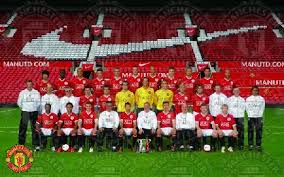 | 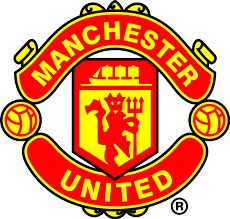 |  | 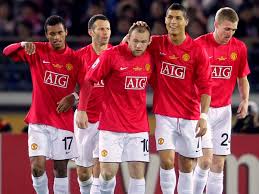 |



